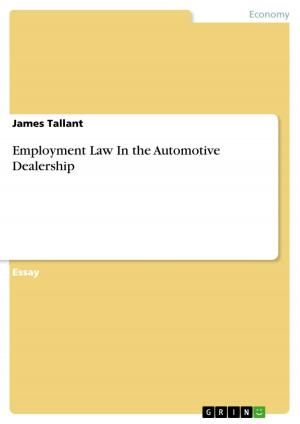Does socially responsible behaviour positively affect the cooperation's profitability?
An investigation onto various CSR practices and its outcomes in UK-based businesses with special focus on the British retailer Marks & Spencer
Business & Finance, Management & Leadership, Management| Author: | Lina Helena Kamal | ISBN: | 9783656000907 |
| Publisher: | GRIN Publishing | Publication: | September 7, 2011 |
| Imprint: | GRIN Publishing | Language: | English |
| Author: | Lina Helena Kamal |
| ISBN: | 9783656000907 |
| Publisher: | GRIN Publishing |
| Publication: | September 7, 2011 |
| Imprint: | GRIN Publishing |
| Language: | English |
Master's Thesis from the year 2011 in the subject Business economics - Business Management, Corporate Governance, grade: MSc Degree awarded (Merit) , Oxford Brookes University (Faculty of Business), course: MSc in Business Management, language: English, abstract: Corporate Social Responsibility and sustainability are terms that are increasingly associated with businesses today. In this thesis we take a closer look at the practices involved in being a socially responsible cooperation and assess its influence on the performance of the cooperation to see if CSR behavior adds to the corporation's profitability? The author's choice was to study Marks and Spencer's sustainability strategy; plan A, for its responsible initiatives across its business operations have been creating debate and interest in the UK's consumer market since its announcement in the year 2007. The methodology's process was inductive and followed a qualitative in-depth approach with the application of BSC, balanced score card; an assessment of M&S' sustainability plan was conducted on four business aspects, customers, employees, internal processes and last the financial aspect. All was analyzed in the light of Hart and Milstein's sustainability value framework. Nevertheless a quantitative approach was adopted through a financial performance comparison to British retailer John Lewis; to draw conclusions if M&S sustainability plan has indeed acted as a differentiator in performance against a competitor. The findings supported no increased profitability for the cooperation. However they did reveal that socially responsible co operations do achieve better value proposition, better branding, and are generally more resilient to scandals as a result of higher trust from the customers' side. Conclusions drawn from M&S study were that CSR practices help maintain and attract talent; it engages customers and increases their likelihood of repeat purchases, it also creates savings through a variety of efficiency measures on operational levels; small savings scattered across locations and departments which could substantially decrease the total cost of doing business.
Master's Thesis from the year 2011 in the subject Business economics - Business Management, Corporate Governance, grade: MSc Degree awarded (Merit) , Oxford Brookes University (Faculty of Business), course: MSc in Business Management, language: English, abstract: Corporate Social Responsibility and sustainability are terms that are increasingly associated with businesses today. In this thesis we take a closer look at the practices involved in being a socially responsible cooperation and assess its influence on the performance of the cooperation to see if CSR behavior adds to the corporation's profitability? The author's choice was to study Marks and Spencer's sustainability strategy; plan A, for its responsible initiatives across its business operations have been creating debate and interest in the UK's consumer market since its announcement in the year 2007. The methodology's process was inductive and followed a qualitative in-depth approach with the application of BSC, balanced score card; an assessment of M&S' sustainability plan was conducted on four business aspects, customers, employees, internal processes and last the financial aspect. All was analyzed in the light of Hart and Milstein's sustainability value framework. Nevertheless a quantitative approach was adopted through a financial performance comparison to British retailer John Lewis; to draw conclusions if M&S sustainability plan has indeed acted as a differentiator in performance against a competitor. The findings supported no increased profitability for the cooperation. However they did reveal that socially responsible co operations do achieve better value proposition, better branding, and are generally more resilient to scandals as a result of higher trust from the customers' side. Conclusions drawn from M&S study were that CSR practices help maintain and attract talent; it engages customers and increases their likelihood of repeat purchases, it also creates savings through a variety of efficiency measures on operational levels; small savings scattered across locations and departments which could substantially decrease the total cost of doing business.















